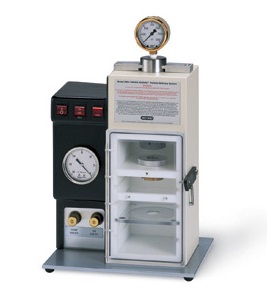Link From : Home | Educational & Research Items | Biolistic Particle Delivery System
PART NUM : 1652258
COMPANY : BIO RAD
 The PDS-1000/He system accelerates nucleic acid–coated gold or tungsten microparticles (0.6–1.6 µm) to velocities necessary to transfect cells, tissues, or organelles. The system uses a burst of high-pressure helium gas to accelerate a plastic macrocarrier disk carrying microparticles toward target cells.
The PDS-1000/He system accelerates nucleic acid–coated gold or tungsten microparticles (0.6–1.6 µm) to velocities necessary to transfect cells, tissues, or organelles. The system uses a burst of high-pressure helium gas to accelerate a plastic macrocarrier disk carrying microparticles toward target cells.
The helium pressure used to propel the macrocarrier is determined by the choice of rupture disk, a plastic seal designed to burst at a specific pressure. A stopping screen retains the macrocarrier while allowing the microparticles to pass through and penetrate the target cells. To increase the efficiency of the process, the chamber may be evacuated to subatmospheric pressures, reducing the frictional drag on the microparticles as they travel toward the target cells
Key Features
→ A reproducible method for transforming intact cells in culture, requiring little manipulation of cells
→ Transformation of cells with unique growth requirements that are not amenable to other methods of transfection
→ Maximum control
→ High reproducibility
PDS-1000/He System with Hepta™ Adaptor
The Hepta adaptor for the PDS-1000/He biolistic system enables 7–10 times more cells to be transformed than the standard system. It fits into the shocking chamber of the PDS-1000/He system where it splits the helium shock wave over seven macrocarriers. By uniformly spreading the DNA-coated gold or tungsten particles over this larger area, the system maximizes the number of cells transformed during one bombardment. As the helium is split seven ways, pressure and particle velocities are reduced, making the system ideal for plants and cell cultures requiring less forceful penetration.
Specification :
Biolistic Particle Delivery System
He and Hepta SystemsNewPART NUM : 1652258
COMPANY : BIO RAD
| CODE | MODEL | DESCRIPTION | CATALOGUE |
| D167/10 | PDS1000 | PDS-1000/HEPTA SYSTEM GENE GUN WITH HEPTA ADAPTOR SYS. INCLUDES HELIUM PRESSURE REGULATOR, SOLINOID, SPACER ROD ETC |
|---|

The helium pressure used to propel the macrocarrier is determined by the choice of rupture disk, a plastic seal designed to burst at a specific pressure. A stopping screen retains the macrocarrier while allowing the microparticles to pass through and penetrate the target cells. To increase the efficiency of the process, the chamber may be evacuated to subatmospheric pressures, reducing the frictional drag on the microparticles as they travel toward the target cells
Key Features
→ A reproducible method for transforming intact cells in culture, requiring little manipulation of cells
→ Transformation of cells with unique growth requirements that are not amenable to other methods of transfection
→ Maximum control
→ High reproducibility
PDS-1000/He System with Hepta™ Adaptor
The Hepta adaptor for the PDS-1000/He biolistic system enables 7–10 times more cells to be transformed than the standard system. It fits into the shocking chamber of the PDS-1000/He system where it splits the helium shock wave over seven macrocarriers. By uniformly spreading the DNA-coated gold or tungsten particles over this larger area, the system maximizes the number of cells transformed during one bombardment. As the helium is split seven ways, pressure and particle velocities are reduced, making the system ideal for plants and cell cultures requiring less forceful penetration.
Specification :
| Dimensions (W x D x H) | 29 x 25.5 x 47.5 cm |
|---|---|
| Construction | Aluminum, ABS plastic, and acrylic chassis |
| Weight | 15 kg |
| Electrical input voltage | 100–120 VAC, 50–60 Hz |
| Maximum current | < 5="" /> |
| Mechanical | |
| Fuse | 6.3 A, 250 V, 5 x 20 mm |
| Vacuum | < 0.4="" inches="" mercury="" min="" /> |
| Overpressure | 0.5 psi relief valve, self-resetting |
| Environmental | |
| Operating Temperature | 0–35°C (32–95°F) |
| Humidity | 0–95% noncondensing |
| Storage Temperature | 0–70°C (32–158°F) |
| Humidity | 0–95% noncondensing |
Note : Please mention the product "CODE" while making request for quotation and send it to info@globalxesslab.com






